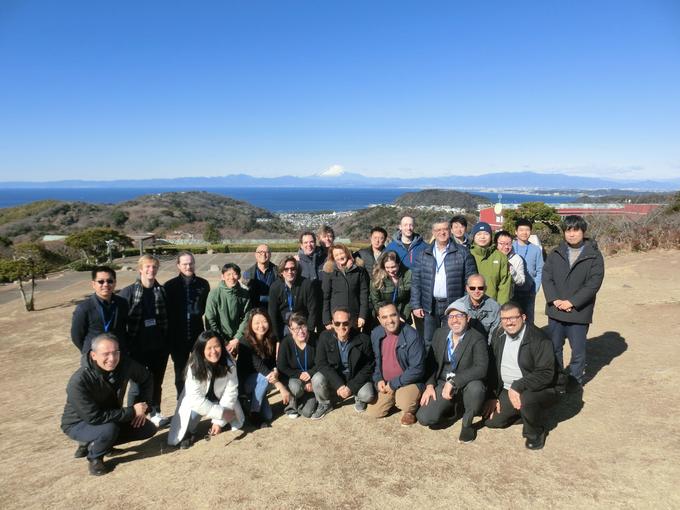NO.210 Advancing Mobility Data Science and Mobility AI
February 17 - 20, 2025 (Check-in: February 16, 2025 )
Organizers
- Flora Salim
- University of New South Wales Sydney, Australia
- Andreas Zufle
- Emory University, USA
- Mahmoud Sakr
- Université libre de Bruxelles, Belgium
- Kyoung-Sook Kim
- National Institute of Advanced Industrial Science and Technology (AIST), Japan
- Peer Kroger
- University of Kiel, Germany

Overview
Description of the Meeting
The proliferation of handheld GPS enabled devices, spatial and spatio-temporal data is generated, stored, and published by billions of users in a plethora of applications. Multiple communities, in computer science, outside computer science, and in industry, have responded to the pertinent challenges and proposed solutions to individual problems. These communities include mobile data management, spatial data mining, geography, transportation engineering, spatial privacy, and spatial epidemiology. In addition, the AI and machine learning communities have also started exploring spatio-temporal and mobility data. Integrating these communities around the common interest of AI and data science around spatio-temporal and mobility-related problems is the best chance to achieve impactful end-to-end solutions to real world problems in our cities. This Shonan meeting will follow the success of the Dagstuhl Seminar on Mobility Data Science held in January 2022 (https://www.dagstuhl.de/en/program/calendar/semhp/?semnr=22021), and expand it to the Mobility AI (or GeoAI) community.
Topics
The meeting will discuss three main topics. First, the foundation of mobility data science and mobility AI research, that is, the open large-scale datasets. Second, the reproducibility of algorithms and models. Finally, future directions, especially cross-discipline directions and cross-country collaborations. For each topic, we will discuss several research questions described as follows.
Open Large-scale Datasets
The success of developing advanced models for various applications largely depends on high-quality large-scale datasets. In mobility data science and mobility AI research, most research works still rely on traditional datasets like Geolife, Gowalla, TaxiPorto, and FourSquare, which were introduced a decade ago. The meeting will discuss the challenges and questions towards developing large-scale open datasets such as:
- What are the challenges of collecting and publishing modern mobility data?
- How to assess the quality of mobility data?
- How to address the privacy concerns in releasing large-scale mobility data?
- Which data models facilitate the integration of heterogeneous data from multiple sources?
Reproducibility
In comparison to other research communities such as CV and NLP, the reproducibility in the mobility data science/AI research area is overlooked. For example, a proposed model or algorithm is rarely evaluated globally. We cannot guarantee the utility of a model in a new scenario even if its implementation is available. We will discuss questions related to the reproducibility, including:
- What are the main reproducibility issues in the community?
- Can we develop a centralized platform for cross-region reproduction?
- How can we design a reproducibility checklist for mobility data science/AI research?
- How to conduct benchmarking research for each mobility data science/AI research task?
New Directions
Another important aspect of this meeting is to shape the future of mobility data science and mobility AI (e.g., in the next 10 years). We believe with proper designing, the research of mobility could bring many benefits to our daily life in multiple ways. Research questions discussed will include:
- What are the priority areas of focus for the advancement of mobility data science/AI?
- How can we conduct responsible mobility data science/AI research for other disciplines such as for Intelligent Transportation, business intelligence, emergency and disaster response?
- How can we strengthen the cross-country collaborations to leverage data with more diverse geographical characteristics?
- How to foster interdisciplinary collaborations on a regular basis?
Meeting Outcomes
Agenda for Large-scale Dataset
One of the main discussion topic of the meeting will be around the large-scale datasets for mobility data science and mobility AI research. We therefore intend to compile a practical agenda for establishing such a dataset in the next few years.
Joint Project Initiatives
The meeting will facilitate establishing collaborations between multidisciplinary research groups and industry, leading for partnerships, and eventually joint funding applications.
A Journal Special Issue
To promote cross-disciplinary research and collaborations, we aim to deliver a call for special issue. This special issue intends to bring together researchers and practitioners working on machine learning algorithms and techniques for location data in multiple areas, including Spatial Data Scientists and GeoAI researchers.
A Collection of Abstracts, Presentations, and Videos
The presented material in the presentation and discussion sessions will be made available on the website of the seminar. Following the recent practice of online conferences during COVID-19 lockdown, we also plan to record the videos of the sessions when appropriate, and publish them for a wider audience.
Meeting Activities and Schedule
Overall, this meeting will be scheduled for 4 days. The main activities include: panel talks, hands on workshop discussions, and breakout group discussions, and also an excursion. The first day of the meeting will be focused on creating a maximum degree of interaction between participants. It is important to introduce everyone to everyone. We will invite every participant to give a short 5 minute introduction of themselves and their work. This shall be followed by a speed dating session, in which participants will be divided into groups, based on the domain of work. This will be followed with plenary talks in the morning and hands-on ideation in the afternoon. On the second and third day, we will focus on the variety of topics in breakout groups. On the last day, participants will present the summary of discussions identified in the previous three days. The purpose of these work groups is to collectively produce the anticipated outcomes of the meeting.
